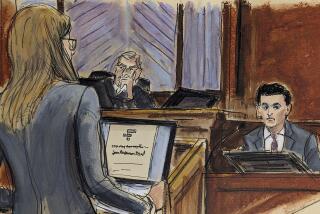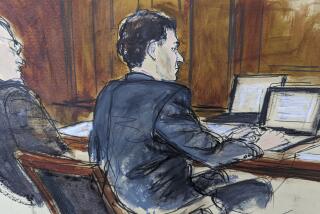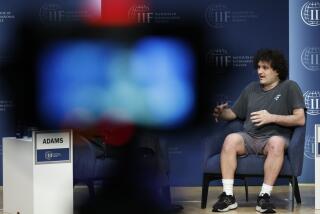Lay: Violations Lacked Intent
- Share via
HOUSTON — The sideshow legal proceeding to the 3 1/2 -month Enron Corp. trial wound down Tuesday with company founder Kenneth L. Lay testifying that he had no intention to commit fraud when he violated provisions of a Depression-era banking law.
Lay acknowledged his signature on forms explaining the law, known as Regulation U, but added, “I doubt I read in detail any of those loan documents.” He portrayed himself as only vaguely familiar with the law.
The testimony came under cross-examination by prosecutor John C. Hueston near the conclusion of Lay’s nonjury trial on four counts of bank fraud.
The three-day “bench trial,” to be decided by U.S. District Judge Sim Lake, was conducted during jury deliberations in the larger conspiracy and fraud trial of Lay and former Enron Chief Executive Jeffrey K. Skilling. Lake said he would withhold his decision in the bench trial until the jury in the main trial returned its verdict. That eight-woman, four-man jury completed a fourth day of deliberations Tuesday without reaching a decision.
Each bank-fraud charge carries a maximum prison term of 30 years, but legal experts said that if convicted, Lay, 64, would probably receive a far lighter sentence because there was no evidence of loss. The $75 million of loans involved, from three banks, were paid in full.
Regulation U was adopted to protect the stock market after it was determined that risky lending practices had worsened the 1929 crash. The law established more conservative collateral requirements for loans used to purchase stock.
Under “Reg U,” if a loan is secured by stock and the proceeds will be used to purchase additional stock, a federally chartered bank may lend only 50% of the value of the stock held as collateral.
According to the government, Lay chafed under those restrictions and sought maximum borrowing power on his tens of millions of dollars worth of Enron stock. Beginning with a credit line established in 1993, he falsely promised that the loan proceeds would not be used to purchase other stock, prosecutors said, knowing that promise would enable him to borrow as much as 80% of the value of the Enron shares he pledged as collateral.
Hueston’s 80-minute cross-examination of Lay had little of the tension and drama of the clash between the same two antagonists during the main trial, although Lay occasionally showed signs of annoyance.
“Mr. Hueston,” Lay said at one point, “Reg U was just not something I carried around in my hip pocket.”
In a brief closing argument, George McCall “Mac” Secrest, a defense lawyer for Lay, attacked the government for even bringing the bank-fraud case, saying, “Criminal prosecution for violations of Reg U is virtually unprecedented.” Lay admitted to violating some of the law’s provisions, but he utterly lacked criminal intent, Secrest said.
Prosecutor Sean M. Berkowitz, in his closing remarks, said that when Lay “got his hand caught in the cookie jar,” he tried to say it was “somebody else’s hand.”
He noted Lay’s testimony that his employees sometimes executed personal loan documents for him by using an “auto-pen” device that reproduced his signature. Lay also said he relied on financial advisors and lawyers to review the documents.
“Unfortunately,” Berkowitz said, “Mr. Lay seems constitutionally incapable of accepting responsibility.”
The jury in the main trial sent Judge Lake a note Tuesday afternoon saying that they did not intend to deliberate Friday or Monday, Memorial Day. The panel has set itself a usual schedule of 8 a.m. to 4 p.m., Monday through Thursday.
More to Read
Inside the business of entertainment
The Wide Shot brings you news, analysis and insights on everything from streaming wars to production — and what it all means for the future.
You may occasionally receive promotional content from the Los Angeles Times.










